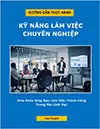|
|
Bộ Công Cụ Kỹ Năng Quản Trị Cảm Xúc
(Emotional Management Skills Toolkits)

1. Giới thiệu bộ toolkits:
Bộ công cụ “Kỹ Năng Quản Trị Cảm Xúc (Emotional Management Skills Toolkits)”
được thiết kế nhằm giúp các nhà quản lý, nhân viên và lãnh đạo phát triển khả
năng nhận diện, kiểm soát và điều hướng cảm xúc một cách hiệu quả trong công
việc và cuộc sống. Bộ công cụ tập trung vào việc xây dựng trí tuệ cảm xúc (EQ),
tăng khả năng tự nhận thức, tự điều chỉnh, đồng cảm và giao tiếp hiệu quả. Đây
là nền tảng quan trọng để duy trì sự cân bằng tinh thần, giảm căng thẳng và nâng
cao hiệu suất cá nhân cũng như tập thể trong môi trường doanh nghiệp.
2. Đối tượng sử dụng:
- Lãnh đạo, quản lý cấp trung và cấp cao trong doanh nghiệp.
- Nhân viên làm việc trong môi trường áp lực cao hoặc có yêu cầu giao tiếp
thường xuyên.
- Bộ phận nhân sự, đào tạo, phát triển năng lực lãnh đạo và văn hóa doanh
nghiệp.
- Các chuyên gia tư vấn, huấn luyện viên nội bộ (coaches, mentors) trong chương
trình phát triển kỹ năng mềm.
- Các nhóm làm việc đa văn hóa, cần phát triển kỹ năng điều tiết cảm xúc và xây
dựng mối quan hệ tích cực.
3. Nội dung bộ toolkits:
Part 1. Emotional Awareness & Identification
Objective: To help individuals recognize their emotional patterns, triggers,
and early signals through structured reflection and tracking tools.
1. EMS-0101_Emotion_Awareness_Self-Assessment.docx
2. EMS-0102_Emotional_Trigger_Log.xlsx
3. EMS-0103_Emotion_Labeling_Guide.docx
4. EMS-0104_Daily_Emotion_Tracker.xlsx
5. EMS-0105_Mood_Pattern_Analysis_Template.xlsx
6. EMS-0106_Emotion_Recognition_Skills_Checklist.docx
7. EMS-0107_Emotional_Reflection_Journal.docx
Part 2. Emotional Regulation & Control Strategies
Objective: To provide techniques, action plans, and exercises to regulate and
manage emotional responses effectively in professional situations.
1. EMS-0201_Emotion_Regulation_Techniques_Guide.docx
2. EMS-0202_Stress_Response_Tracker.xlsx
3. EMS-0203_Emotional_Control_Action_Plan.xlsx
4. EMS-0204_Self-Regulation_Practice_Log.xlsx
5. EMS-0205_Cognitive_Reframing_Worksheet.docx
6. EMS-0206_Emotional_Balance_Checklist.docx
7. EMS-0207_Calmness_Improvement_Plan.xlsx
Part 3. Emotional Intelligence (EQ) Assessment & Growth
Objective: To evaluate, develop, and strengthen the five key components of
emotional intelligence: self-awareness, self-regulation, motivation, empathy,
and social skills.
1. EMS-0301_Emotional_Intelligence_Self-Test.xlsx
2. EMS-0302_EQ_Skills_Assessment_Form.docx
3. EMS-0303_EQ_Development_Plan.xlsx
4. EMS-0304_Emotional_Competency_Matrix.xlsx
5. EMS-0305_EQ_Improvement_Actions_Guide.docx
6. EMS-0306_Motivation_and_Self-Drive_Worksheet.docx
7. EMS-0307_Emotional_Progress_Scorecard.xlsx
Part 4. Empathy & Relationship Management
Objective: To enhance interpersonal understanding, empathy, and emotional
connection within teams and customer interactions.
1. EMS-0401_Empathy_Skills_Assessment.docx
2. EMS-0402_Active_Listening_Checklist.docx
3. EMS-0403_Empathetic_Communication_Template.docx
4. EMS-0404_Stakeholder_Emotion_Map.xlsx
5. EMS-0405_Empathy_Development_Action_Plan.xlsx
6. EMS-0406_Collaborative_Emotion_Response_Guide.docx
7. EMS-0407_Team_Connection_Exercise_Template.docx
Part 5. Workplace Stress & Emotional Resilience Management
Objective: To help employees handle stress constructively, build resilience,
and maintain emotional stability under pressure.
1. EMS-0501_Work_Stress_Assessment_Sheet.xlsx
2. EMS-0502_Stress_Trigger_Log.xlsx
3. EMS-0503_Resilience_Building_Plan.docx
4. EMS-0504_Emotional_Resilience_Self-Test.xlsx
5. EMS-0505_Stress_Reduction_Techniques_Guide.docx
6. EMS-0506_Workload_vs_Stress_Balance_Chart.xlsx
7. EMS-0507_Personal_Resilience_Improvement_Plan.xlsx
Part 6. Emotional Communication & Conflict Management
Objective: To improve emotional expression, assertiveness, and conflict
resolution through emotionally intelligent communication.
1. EMS-0601_Assertive_Communication_Techniques.docx
2. EMS-0602_Conflict_Emotion_Analysis_Form.xlsx
3. EMS-0603_Emotionally_Intelligent_Feedback_Template.docx
4. EMS-0604_Conflict_Resolution_Log.xlsx
5. EMS-0605_Emotional_Response_Preparation_Guide.docx
6. EMS-0606_Emotionally_Safe_Conversation_Script.docx
7. EMS-0607_Communication_Effectiveness_Scorecard.xlsx
Part 7. Mindfulness & Emotional Reset Practices
Objective: To introduce mindfulness-based techniques for emotional balance,
focus, and self-regulation.
1. EMS-0701_Mindfulness_Practice_Log.xlsx
2. EMS-0702_Breathing_and_Meditation_Guide.docx
3. EMS-0703_Mindful_Reflection_Template.docx
4. EMS-0704_Stress_and_Emotion_Balance_Tracker.xlsx
5. EMS-0705_Mindful_Pause_Exercise_Script.docx
6. EMS-0706_Emotion_Reset_Routine_Plan.xlsx
7. EMS-0707_Mindfulness_Progress_Dashboard.xlsx
Part 8. Leadership & Emotional Influence
Objective: To enable leaders to use emotional intelligence to inspire,
motivate, and connect with their teams effectively.
1. EMS-0801_Emotionally_Intelligent_Leadership_Guide.docx
2. EMS-0802_Leader_Emotion_Impact_Assessment.xlsx
3. EMS-0803_Team_Emotion_Climate_Survey.xlsx
4. EMS-0804_Leader_Coaching_Conversation_Template.docx
5. EMS-0805_Emotional_Modeling_Plan.docx
6. EMS-0806_Leadership_Empathy_Checklist.xlsx
7. EMS-0807_Emotional_Influence_Action_Plan.xlsx
Part 9. Measuring Emotional Health & Progress
Objective: To measure emotional well-being, workplace harmony, and
improvement trends using quantifiable indicators.
1. EMS-0901_Emotional_Wellness_Survey.xlsx
2. EMS-0902_Employee_Sentiment_Analysis_Sheet.xlsx
3. EMS-0903_Emotional_Health_Monitoring_Dashboard.xlsx
4. EMS-0904_Emotion_Improvement_Metrics_Report.docx
5. EMS-0905_Team_Emotion_Trend_Chart.xlsx
6. EMS-0906_Emotional_Development_Scorecard.xlsx
7. EMS-0907_Monthly_Emotional_Status_Report.docx
Part 10. Continuous Growth & Emotional Maturity
Objective: To sustain emotional intelligence growth through reflection,
mentorship, and structured development programs.
1. EMS-1001_Emotional_Growth_Plan.xlsx
2. EMS-1002_Lessons_Learned_Reflection_Form.docx
3. EMS-1003_Personal_Emotional_Maturity_Index.xlsx
4. EMS-1004_Emotion_Development_Goal_Setting_Template.xlsx
5. EMS-1005_Emotional_Coaching_Session_Log.docx
6. EMS-1006_Emotional_Learning_Journal.docx
7. EMS-1007_Annual_Emotional_Development_Report.docx
4. Nguyên tắc sử dụng:
- Các file .docx dùng cho hoạt động phản chiếu, lập kế hoạch, hướng dẫn kỹ thuật
và đào tạo.
- Các file .xlsx dùng cho việc đo lường, phân tích, theo dõi và đánh giá kết quả
quản trị cảm xúc.
- Mỗi phần được thiết kế độc lập nhưng có thể tích hợp trong chương trình đào
tạo EQ tổng thể.
- Khi triển khai cần duy trì tính bảo mật và trung thực trong phản hồi cảm xúc.
- Khuyến khích sử dụng trong huấn luyện 1-1, workshop nhóm, hoặc chương trình
phát triển lãnh đạo.
5. Hướng dẫn triển khai trong doanh nghiệp:
- Bước 1: Đánh giá hiện trạng cảm xúc và nhu cầu đào tạo EQ của đội ngũ.
- Bước 2: Tổ chức workshop hoặc chương trình đào tạo kỹ năng quản trị cảm xúc
theo từng cấp bậc.
- Bước 3: Áp dụng các biểu mẫu phản chiếu, nhật ký cảm xúc, và công cụ EQ
assessment trong môi trường thực tế.
- Bước 4: Theo dõi kết quả qua bảng chỉ số và dashboard đo lường tiến bộ cảm
xúc.
- Bước 5: Duy trì chương trình hỗ trợ, coaching và mentoring để củng cố kết quả.
6. Kết quả mong đợi sau áp dụng:
- Cải thiện khả năng kiểm soát cảm xúc, giảm xung đột và stress trong công việc.
- Tăng mức độ đồng cảm, hợp tác và gắn kết giữa các cá nhân trong tổ chức.
- Hình thành văn hóa giao tiếp tích cực và bền vững.
- Lãnh đạo thể hiện khả năng quản trị cảm xúc cao, truyền cảm hứng cho nhân
viên.
- Nâng cao hiệu suất làm việc, năng lượng tích cực và sức khỏe tinh thần toàn
doanh nghiệp.

 Translate
Translate











